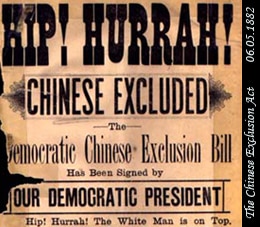“Sui Sin F ar” is a chapter of the book Entre dos mundos compiled and edited by Aitor Ibarrola-Armendariz. Sui Sin Far, her pen name, is the Cantonese name of the narcissus flower, popular amongst Chinese people. Her real name was Edith Maud Eaton (1865-1914) and she was born in England. She was the first author with Chinese ancestry in defending the rights of her countrymen in America. She faced the widespread belief at the time that the Chinese were unable to assimilate into Western culture. The hatred and fear of the Chinese had spread throughout the nation in the second half of the XIX century as a fact that led to the “Chinese Exclusion Act” of 1882. It forbade the entry of Chinese immigrants in the country.
ar” is a chapter of the book Entre dos mundos compiled and edited by Aitor Ibarrola-Armendariz. Sui Sin Far, her pen name, is the Cantonese name of the narcissus flower, popular amongst Chinese people. Her real name was Edith Maud Eaton (1865-1914) and she was born in England. She was the first author with Chinese ancestry in defending the rights of her countrymen in America. She faced the widespread belief at the time that the Chinese were unable to assimilate into Western culture. The hatred and fear of the Chinese had spread throughout the nation in the second half of the XIX century as a fact that led to the “Chinese Exclusion Act” of 1882. It forbade the entry of Chinese immigrants in the country.

The Chinese Exclusion Act was a United States federal law signed by Chester A. Arthur, following revisions made in 1880 to the Burligngame Teatry of 1868. Those revisions allowed the U.S.A to suspend immigration, and Congress subsequently acted quickly to implement the suspension of Chinese immigration, a ban that was intended to last 10 years. This law was repealed by the Magnuson act on December 17, 1943.
None of the Eaton children learned their mother’s native language and most of them had no contact with other Chinese people. Moreover, her sister Winnifred, an immensely energetic writer, adopted a Japanese persona and the Japanese-sounding but apparently meaningless pseudonym “Onoto Watanna” to produce twelve best-selling romances in the sentimental and melodramatic idiom.
Though her writing career began on the Montreal newspaper, The Star, she was to make her mark in the United States (she lived most of her adult life in Boston, Seattle, and San Francisco), writing articles and short stories using the Chinese pseudonym Sui Sin Far.
Eaton’s article, “Leaves from the Mental Portfolio of an Eurasian”, chronicles more directly her experiences of alienation and sorrow.
“I have come from a race on my mother’s side which is said to be the most stolid and insensible to feeling of all races,” she wrote.
“Prefiero ser china a cualquier otra cosa en el mundo”
“Al fin y al cabo, no tengo nacionalidad ni estoy ansiosa por reclamar ninguna. El individuo es más que la nacionalidad. “Tú eres tú y yo soy yo”, dice Confuccio. Doy mi mano derecha a los occidentales y mi mano izquierda a los orientales, esperando que entre unos y otros no destruyan por completo este insignificante “lazo de unión”. Y eso es todo.”
At the time of her death, the newspapers were full of stories about keeping Asian children out of public schools in reaction to the murder of a white woman by her Chinese “houseboy,” and the Chinese Exclusion Act had been extended indefinitely.
References
- Aitor Ibarrola (2005) “Entre dos mundos”. En Edición mensajero.
- Sui Sin Far. (January 21, 1909). “Leaves from the Mental Portfolio of an Eurasian”. In Independent 66.
- Secretariado de publicaciones de la Universidad de León (2003) “Páginas del archivo mental de una euroasiática. (2003)
- Piyali Dalal (23.5.2001) “Biography / Criticism ” in Voices from the Gaps. Retrieved 4.12.2011 from http://voices.cla.umn.edu/artistpages/eatonEdith.php
Filed under: Multiculturality Tagged: Cantonese, Chinese, Edith Maud, Entre dos mundos, Sui Sin Far
![]()